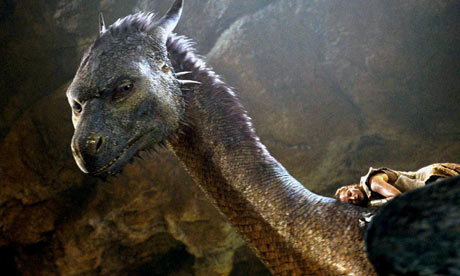
I've given up on vampires. Nothing against R-Patz and the face that launched a thousand samplers, but I preferred it when our fanged friends embodied more transgressive desires. From Le Fanu's Carmilla, who gazed "with languid and burning eyes" and "the ardour of a lover" at the maiden friend she fed on, or the savagely voluptuous post-mortem Lucy Westenra, we've got to a point where the angsty black and red covers of teen vamp romances are the darkest thing about the books, and the bad guys have given up all pretensions to the Count's charisma.
Twihards? Too dull. For those who haven't washed their hands of vampires, I recommend Robin McKinley's Sunshine as a ray of light in the gloaming. McKinley's haemovores are alien, scary and amoral – old-school, in a word – and there's a sense of genuine transgression when the heroine starts to fraternise. But when it comes to mythological monsters, I'm going back to dragons.
Dragons have traditionally occupied an ambiguous moral ground in fantasy; even the good ones may turn on you at any moment. It's unwise to trust a dragon or to look one directly in the eye, as Bilbo nearly does with Smaug, or you might end up hypnotised and ingested. Knowing their true names sometimes confers power – Ged binds a marauding dragon by this means in Ursula Le Guin's A Wizard of Earthsea. Otherwise, they are generally renowned for cruelty, greed, wisdom, magic, fire-breathing, gold fetishes and long lives. Good dragons work symbiotically with humans, giving their small riders psyche-widening insights, long-distance transport or answers to difficult questions. Bad ones are likely to steal your treasure and make a nest of your bones.
The best dragons of the decade, for my money, are Temeraire and his cohorts in Naomi Novik's eponymous series of alternate histories of the Napoleonic wars in which England and France boast dragon air-forces as well as the more traditional army and navy. In convincingly straitlaced 19th-century prose, Novik chronicles the partnership of Temeraire, a rare Chinese dragon captured in the egg, and Laurence, a Navy captain whose ramrod notions of duty and patriotism are disrupted by Temeraire's casual radicalism. Their developing bond is set against a spectrum of dragon breeds (Regal Coppers, Winchesters, vitriol-spitting Longwings) and devoted aviators, who live outside the rigid structures of English society in coverts where female dragon-captains can wear breeches and drink port to their hearts' content. The aviators' outsider status and the intelligent naivete of the dragons allows Novik to examine pompous, paranoid ideas of national identity and the chain of command from a detached, airborne perspective, and the appendices on dragon breeds are satirically brilliant. I can't wait for the next in the series to appear.
I'm also waiting impatiently for the sequel to The Two Pearls of Wisdom, Alison Goodman's exploration of sexual politics in a fantasy Imperial China. Crippled Eon has been groomed to be a Dragon-Eye since childhood, undergoing pain and hardship for the right to be chosen as apprentice by one of the 12 energy dragons whose power and allegiance sway the emperor's court. Chosen by the Mirror Dragon, who has been missing for 20 years, Eon/Eona fails to bond completely because she is too accustomed to concealing her true self (there's a nice play on the "true name" theme here – this time it's the human who has to give up the key to their inner identity to receive the dragon's in return.) Disguising her failure while juggling Imperial favour and malice behind the scenes, Eon realises too late that denying her identity leaves her vulnerable to the ambitious machinations of the Rat Dragon-Eye … The book was so lush, brutal and intriguingly subtle that I forgive it for ending with a terrible cliffhanger, although I hope the next one doesn't.
There are some dragons I don't get on with. Eragon, for instance, has never floated my boat, and I was staggered to discover just how dismal Anne McCaffrey's dragon novels look when re-read past the age of 12. Set in the increasingly unmedieval world of Pern (the Pernese become more computer-literate the more ancient spaceships they discover), the books, particularly the earliest in the series, are jaw-droppingly misogynistic and generally joyless, heavy on drinks called "klah" and drudges wearing excremental colours. McCaffrey's dragons, as it transpires several books later, have been bioengineered from indigenous lizards, which leaches out yet more of the joy as far as I'm concerned. They imprint on humans shortly after hatching in a process known as Impression, for which they have a rather weird system to decide who Impresses whom, based on sexual preference and whether one is a "masculine" or "effeminate" homosexual male. Hmm. Dodgy sexual politics aside, the dragons' telepathic communication is so gnomic (frequent use of "Little one" to reassure perturbed riders, etc), and the world of Pern is such a grim, tawdry one that I can't imagine ever wishing to revisit it.
For me, the best dragon-fantasy examines human nature by the use of dragons as a distorted mirror – creatures like us in intelligence but unlike in almost every other way. Sometimes the dragons' state is enviable, superior to human, as in the denouement of Le Guin's The Other Wind, in which the deformed, shy Tehanu becomes a dragon, a glorious culmination to years of misery and exclusion.
What are your favourite or least favourite literary dragons?

